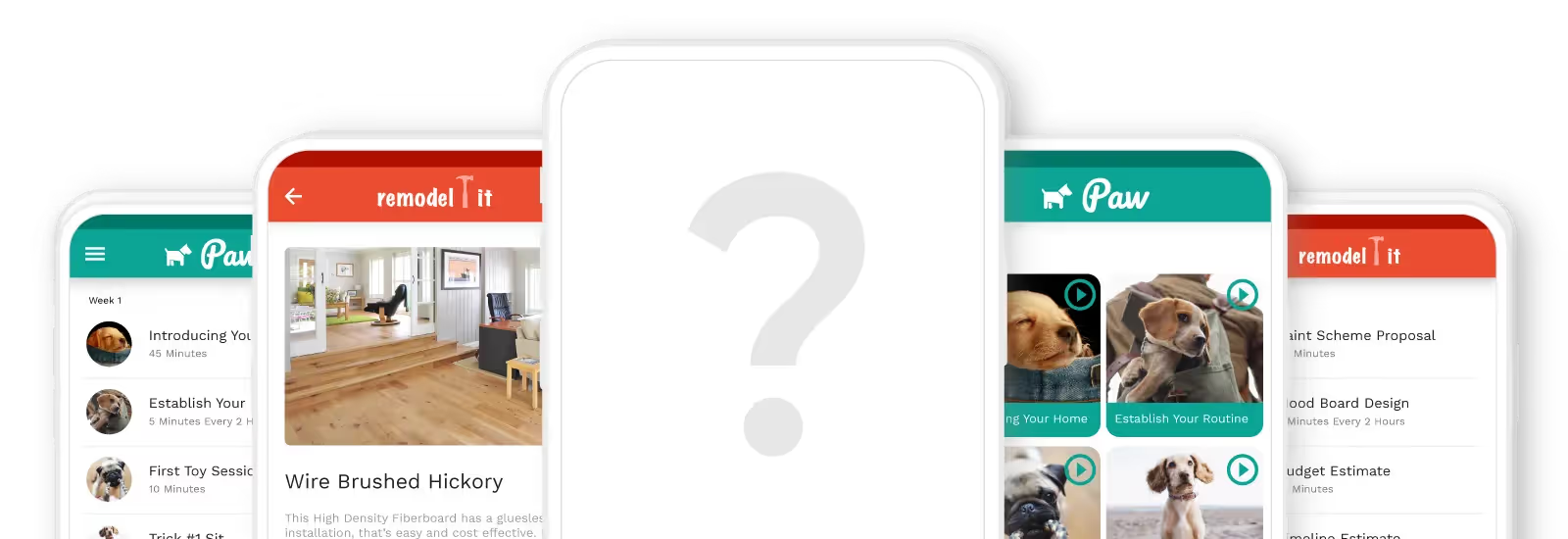
Retool is great for building complex internal tools, while Appsmith offers customizable low-code solutions for enterprises. Adalo stands out with its no-code approach, which is perfect for freelancers and small businesses creating client-facing apps.
Read on as this guide covers:
- Each app’s compatibility with programming languages
- Use-cases
- Pricing and the intended audience
Before we begin, here’s a quick comparison table of Retool vs. Appsmith vs. Adalo's basic offerings.
Retool vs. Appsmith vs. Adalo: A Table of Differences
Similarities
As you can see from the table, Retool, Appsmith, and Adalo share quite a few differences. However, whatever platform you choose will include the following similarities:
- A free version: Rest assured, when faced with Appsmith vs. Retool vs. Adalo, you won’t have to commit money to a platform you know nothing about. Each app builder is equipped with a free version, which lets you get a feel for how it works before you commit to a monthly fee.
- Drag-and-drop interface: When you’re using Adalo, Retool, or Appsmith to build your frontend, you’ll be able to leverage the power of a drag-and-drop interface, similar to creating a PowerPoint. This feature will save you time and doesn’t require entering dozens of lines of code for frontend creation.
- Web app publishing: Each platform lets you publish your app to the web, which users can access through their browsers. This makes it easy for them to find and log into your app.
- Ecosystems: Need some help building a particular feature, integrating a database, or maybe you just want to master the platform? Adalo, Retool, and Appsmith each have robust ecosystems featuring forums to get live help, tutorials for learning the platform properly, and help documentation providing a detailed and technical walkthrough of each functionality.
Retool

Who It’s Good For
Retool is a low-code app builder that’s excellent for businesses of any size, from a small team of a dozen to enormous firms listed on the Dow Jones Industrial Average. It provides a robust platform for creating internal business tools and widgets.
Features
- Even though many folks associate publishing internal business tools with web apps, Retool gives you the option to create native mobile apps that you can publish to the app stores.
This means you can infuse the power of a device’s drivers and hardware into your app, allowing for tools like notifications, barcode scanners, and more, potentially making it more powerful than a web app.
- Folks on your tech team will love that they can patch in JavaScript code almost anywhere on Retool to create custom-made logic, creating an app that executes processes in a one-of-a-kind way.
- While Retool integrates with loads of database providers like PostgreSQL, MongoDB, Airtable, and Google Sheet, it comes with its very own database builder tool, so you don’t need to worry about having a premade database before you start with Retool.
Use Cases
Retool is primarily used to create internal business applications and tools — it’s not really used for making external client-facing applications like restaurant ordering or booking apps.
Most Retool users create admin dashboards to gather metrics and KPIs (key performance indicators), customer support tools, general workflows, inventory management systems, and much more.
Pricing
All of Retool’s tiers are based on the number of user types your app has:
- Standard users, or people who build, edit, and use your app
- End users, or those within your organization who use your app
- External users, folks outside your organization using your app
Retool’s free version allows up to 5 free standard users, 5GB of space, and the ability to run up to 500 monthly workflows. The Team Version charges a monthly fee of $10 per standard user (billed monthly) and another $5 per end user (billed monthly) and gives you up to 5,000 workflows per month.
If you need to include external users, check out the Business Version, which costs $50/month per standard user and $15/month per end user. External users start at $8/month per user (all billed monthly). You’ll also get advanced security controls like audit logs and the ability to grant permissions.
Appsmith

Who It’s Good For
Appsmith is a low-code app builder for medium to large organizations, helping them create specialized internal business tools for executing unique tasks.
Features
- You’ll find one of the most cutting-edge AI tools in the space. For app building, use it to generate your code or create new features. You can also use it as a functionality on a finished app, such as a text analyzer, picture classifier, and more.
- Are you looking to deploy your app on a private cloud or your server? Look no further than Appsmith. It allows for flexible self-hosting, providing lock-down security and freakish-level control over your data and infrastructure. Your tech team will love you.
- Appsmith is an open-source app builder that allows you to contribute to the platform by adding new features, fixing bugs, or perfecting existing functionalities. You can also keep your source code and share it on GitHub to encourage contributions from developers worldwide.
Use Cases
Much like Retool, Appsmith is best suited for tech-savvy teams that need to develop customized internal business applications, such as project management tools, CRM boards, accounting apps, and more.
It’s important to note that you’ll need to bring a database to build an app on Appsmith, but luckily, Appsmith integrates with all the big kid database builders, such as PostgreSQL, MySQL, Oracle, and quite a few more.
Pricing
Appsmith doesn’t provide pricing for its tiers. However, you can request a free trial for the Business Version or schedule a demo for the Enterprise Version.
{{rich-cta}}
Adalo

Who It’s Good For
Adalo is a no-code web app and native mobile app builder that perfectly balances ease, power, and flexibility. It allows you to spark life into any app idea. Adalo is perfect for freelancers, entrepreneurs, and small and medium businesses.
Features
- As the only true no-code app-building platform on our list, you won’t need to know any technical concepts, such as the logic behind coding or how APIs work to build an app with Adalo. If you can turn on a computer, you know even to use Adalo.
- Adalo comes packed with almost 40 templates, preloaded with features like a database, backend logic, Stripe payment integration, and more. These templates are super flexible and customizable enough to create a unique app that can easily perform any function.
- Once you finish creating your app, you can publish it on the web, in the Apple App Store, and the Google Play Store. Adalo is a responsive app builder, meaning you can use the same app version for all three platforms without making significant changes.
Use Cases
Adalo’s variety of templates allows for a bevy of applications. You can create an admin dashboard to showcase business metrics, a client portal for CRM, and project management tools such as a field report app.
However, Adalo’s flexibility goes beyond building internal business tools. You can create a delivery app for your pizza restaurant, a reservation app for your cafe, a taxi app for your designated driver service, and many other client-facing external apps.
Pricing
Start using Adalo for $45/month (billed monthly).
Which Platform Should You Choose?
Ok, so you’ve made it to the end. Now, let’s talk about some factors you should consider when selecting Adalo, Appsmith, or Retool:
- Your technical knowledge: Retool and Appsmith differ from Adalo in one significant way — they’re both low-code platforms, meaning you’ll need some tech experience to use them.
If you want to patch in their lines of code to create unique features, customize your database schema, and leverage other technical mechanisms, you might want to check out the two low-code platforms, Retool and Appsmith.
However, if you’re a total tech novice, Retool and Appsmith will most likely frustrate you, slowing your app-building down to a snail’s pace. We highly recommend people without tech skills pick Adalo. You’ll be able to create a unique, functional, and professional-looking app without knowing how to code.
- App store publishing: While all three platforms allow web app publishing, only Retool and Adalo can make native mobile apps that can go into the Apple App Store and Google Play Store. Sometimes, you might need to create internal business software for the app stores, especially if you plan to sell it to the masses.
- The need for an external client-facing app: Both Retool and Appsmith are designed explicitly for creating internal business apps, tools, and software. Although Retool allows external users, these are meant to be long-term clients with complex work orders, vendors, or partners.
Retool and Appsmith aren’t designed to create external client-facing apps like those for booking tables, appointments, or a niche social media app. If you need an app where clients place orders or share information, Adalo’s the way to go.
- Cost: Cost is among the most critical factors many prioritize when choosing an app builder. Although Appsmith doesn’t publicize its pricing, we’re guessing its lowest-tier plans will start in the $100s/month, with its Enterprise Plan exceeding $10,000/month, depending on the use case. This pricing might be out of reach for many smaller businesses.
Retool’s “pricing per user” model may be highly cost-effective for small teams. However, if your business grows and you add several users, Retool could quickly become very expensive.
Adalo has the most standard pricing tier — you won’t need to contact sales, and you’ll be allowed 1 app editor and 1 published app for $45/month (billed monthly). However, Adalo’s $65/month (billed monthly) version allows for up to 5 app-editors and lets you publish two different apps, which is cost-effective for small businesses.
- Your organization’s size: If you’re a small or medium business, Adalo is probably your best bet because the platform specifically caters to this slice of the economy. However, larger organizations with scaling needs might be better served using Retool or Appsmith, as these platforms are designed with these players in mind.
For anyone who wants to self-host on their private cloud network or server, Appsmith is the best bet. While you’ll most likely be paying a premium for these services, you’ll have bolstered security coupled with complete infrastructure and data control.
Ultimately, we can’t emphasize the importance of trying each platform’s free version. Doing this will give you an idea of how building an app will feel and, in the case of Retool and Appsmith, whether you have the tech skills to work with the platforms.
Next Steps: Create Your App with Adalo
Have you never written a line of code and have no clue how it’s structured, but you still want to build an app for your business? Adalo is your best choice.
Adalo is a true no-code app-building platform: To use it, you won’t need any previous technical or coding knowledge — if you can create an online account, you have the skills to use Adalo.
But don’t think that Adalo sacrifices power for ease of use. Adalo’s flexible enough to build almost any app you can imagine. It comes packed with plugins, add-ons, and 1,000s of third-party integrations, which let you transfer data from other accounts to your Adalo-made app.
And here’s another head-turning fact about Adalo: Compared to Retool vs. Appsmith, Adalo has a very generous free version. Adalo lets you publish your app on the web and take payments with Stripe, all for free. Wait no longer — sign up for Adalo today.














